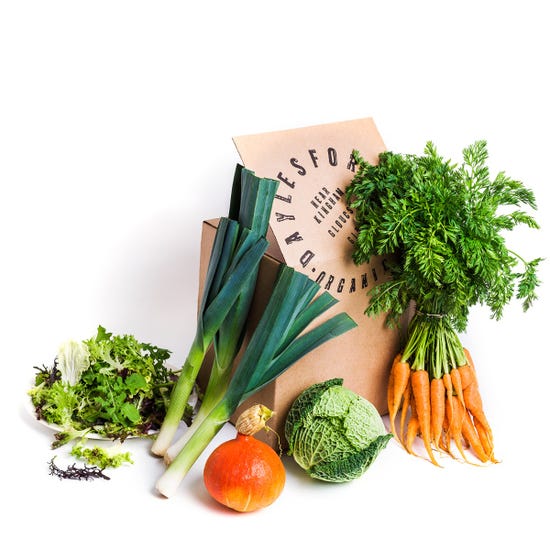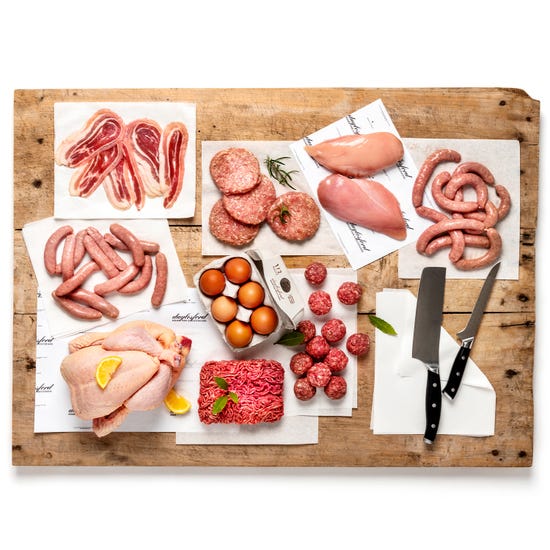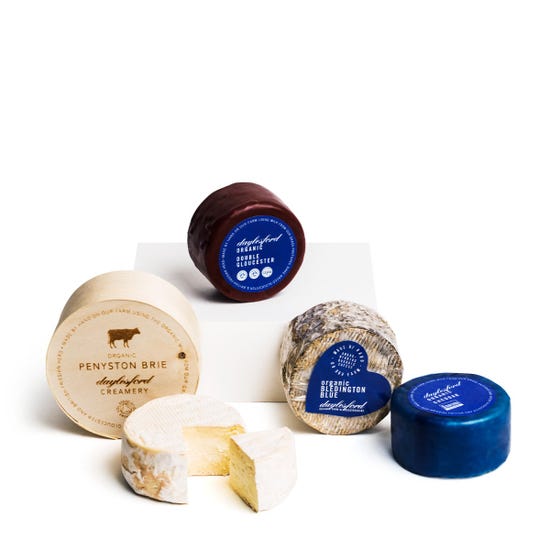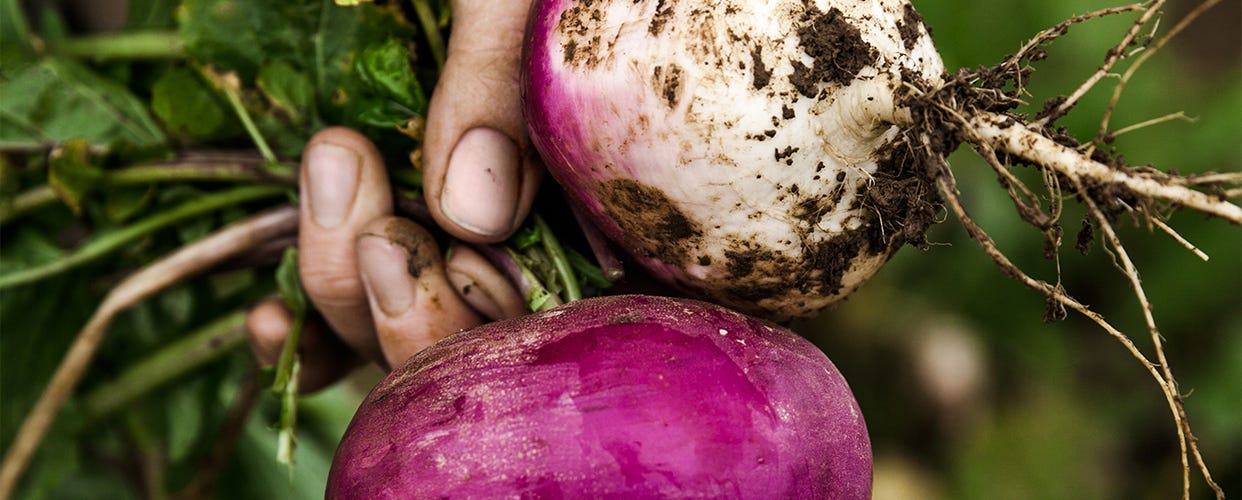
Organic Food: Where Choices Matter Most
The choices we all make every day have real consequences: for our soil, our environment, wildlife, our animals and our own health & wellbeing.
At Daylesford we believe that choosing organic is the best and most ethical decision for all these reasons – and it tastes better too. Knowing where your food comes from and how it is produced is more important than ever. What’s more, everyday shopping and eating choices can influence wider trends and industry standards, helping to make the world a better place.
Choosing organic has a real impact and to help you shop consciously and make informed choices, we have highlighted four key areas below where the benefits of choosing organic are the clearest, and therefore, where your choices matter most. First, we will address some questions we are often asked.
What is organic food?
Organic food is produced via organic agriculture, a globally recognised and regulated production system that uses a range of sustainable agricultural practices based on four key principles: health, ecology, care and fairness. Organic agriculture is a holistic approach to farming and food production that sustains the health of soils, ecosystems, animals and people. This approach recognises the close interrelationships between all parts of the production system, from the soil to way crops are nurtured to the food on our plates.
Organic food is produced with natural fertilisers1,usually less energy2 3 and more care for animals4. Choosing organic food is the best way to limit your exposure to pesticides, herbicides (weedkillers)5 and many additives and preservatives6.
Is organic food better for you?
Organic standards prohibit GM crops and ingredients, hydrogenated fats, and controversial artificial food colours and preservatives7, which are associated with negative health outcomes8, so there are some compelling arguments for how organic food is better for you.
Organic farming affects the quality of the food we eat and has scientifically proven health benefits9. Additionally, in some studies organic food has been shown to contain:
- On average 40% more polyphenols (antioxidants linked to better health)
- Significantly less toxic metals than non-organic
- No traces of pesticide compared to non-organic
- No traces of growth hormone
Is organic food better for the environment?
Organic food is better for the planet, which benefits all of us. For example:
- Land under organic management stores up to 25% more carbon than non-organic
- Avoiding synthetic fertilisers means organic systems produce 40% less nitrous oxide emissions than non-organic, and reduces the amount of nitrogen pollution in waterways
- On average organic farms use a third less energy than systems requiring heavy inputs, as organic systems are naturally closed loop and have to make use of what is at hand – including manure for fertiliser, grass for feed, crop residue for compost…
- Soil erosion is 25% lower in organic than non-organic, due to permanent root structures and cover crops
- Organic farms support biodiversity and are on average 50% more abundant with wildlife, with up to 33% more species
1. ORGANIC CHICKEN
Health benefits of organic chicken
Organic chicken is a lean, high-protein, healthy meat. Organic meat can contain up to 50% more omega 3 fatty acids, because organic animals eat a more natural, grass-based diet containing high levels of clover, which is used instead of chemical fertilisers in organic farming to fix nitrogen so that crops and grass grow.9
High welfare, truly free-range organic chickens grow at a naturally slow pace, giving the meat time to develop a unique flavour resulting in superb eating quality.
Are organic chickens treated better?
Yes, the standards for rearing organic chickens far exceed any other type of farming at every step, including the way they are reared, transported and slaughtered (and on this note, organic chickens live twice as long as most intensively farmed chickens10). Choosing organic means you ensure transparency in what you are buying throughout the whole process.
To give more details about how organic chickens are raised, they are free to roam wide outdoor ranges with no overcrowding and must never have their beaks trimmed. Their instinct to forage for grubs, worms, grass, clover and seeds is nurtured and their natural diet is supported with an organic, GM-free pellet feed. Organic chickens are never caged, live in smaller flocks and have more space than free-range birds11.
What is the difference between free range and organic chicken?
Unfortunately the term free-range does not guarantee high welfare and the best way to guarantee high quality, high-welfare meat is to choose certified organic chicken. There are clear differences in terms of genetics, intensity, antibiotics and feed in the way intensive, non-organic farms rear chickens which we go into in more depth here.




2. ORGANIC EGGS
Benefits of eating organic eggs
Organic eggs are especially high in protein and omega 3, give us all eight essential amino acids and are rich in vitamins (A, D, E & K) and nutrients Betaine and Choline which are necessary for brain development.
Organic vs free-range eggs
Organic standards far exceed free-range when it comes to farming hens for eggs. Organic hens thrive on an outdoor lifestyle with freedom to express their natural behaviours such as pecking and roaming. They enjoy the highest standards of animal welfare including an organic, GM-free diet, smaller flocks which help to keep disease and distress at bay, and never have their beaks trimmed. The routine use of antibiotics is banned.
3. ORGANIC FRUITS & VEGETABLES
Benefits of organic fruits and vegetables
Organic fruits and vegetables are grown in rich, healthy soil that has not been depleted by the overuse of pesticides, fertilisers, GM crops and harsh chemicals.
Many crops are susceptible to absorbing pesticides used in non-organic farming systems and the best way to reduce your exposure is to buy organic.
How to identify organic fruits and vegetables?
Look for recognised accreditation marks such as the Soil Association symbol or the EU Organic logo.
Are organic fruits and vegetables pesticide free?
Organic farming uses no artificial pesticides12.
In organic farming, all weed killers are banned – a very limited number of naturally occurring fungicides and insecticides are permitted and their use is severely restricted13.
By rotating crops and selecting varieties with a natural resistance to particular pests and diseases, organic farmers are able to reduce or avoid disease and the need to control them with chemical inputs.
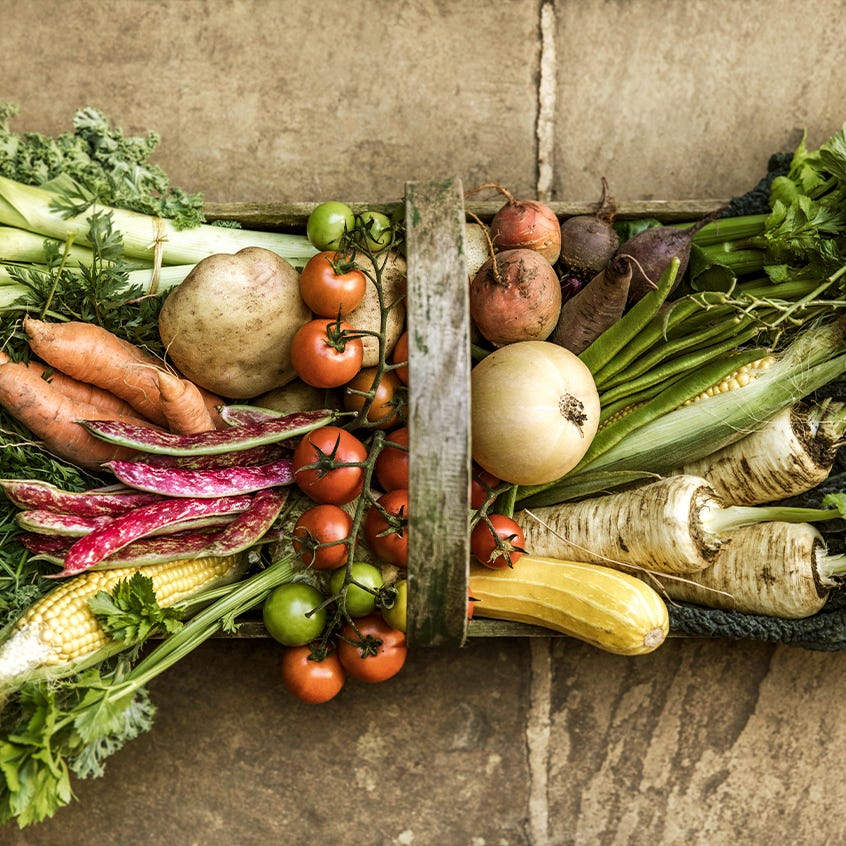



4. ORGANIC DAIRY
Benefits of organic dairy
Research shows that organic milk may be higher in nutritional value with up to 50% more beneficial omega 3 fatty acids, but this figure varies according to the seasons, herds and other factors. So while it is tricky to answer the question "is organic dairy better" from a nutritional standpoint, from a holistic point of view, the answer is a resounding yes when you consider the benefits of choosing organic dairy on animal welfare, the environment, biodiversity and soil health.
Are organic dairy cows treated better?
Yes, organic standards forbid the use of any practice that may harm or distress an animal and animal welfare under Soil Association standards is the highest in the UK.
Organic dairy cows tend to live longer, happier lives thanks to their high welfare, truly free range lifestyles.
The cows in our dairy herd at Daylesford live for an average of 7 lactations compared to the national average of 2.6. They enjoy a 100% GM-free, forage-based diet ideally suited to their ruminant stomachs. Their calves stay with their mothers for six days to get all the beneficial colostrum, after which they are put into small social groups of five and fed fresh milk from the herd. They have little need for medical intervention, so there is no need for the routine use of antibiotics.
Read more insights from our dairy herdsman here and go behind the scenes of our dairy and creamery here.
References:
1 Soil Association Standards for Great Britain, Farming & Growing v1.2 Jan 2023. Standard 2.5
2 Soil Association Standards for Great Britain, Farming & Growing v1.2 Jan 2023. Standard 2.3.3
3 Smith et al. (2015) The energy efficiency of organic agriculture: A review. Renewable Agriculture and Food Systems, 30, 3 “organic farming performs better than conventional
for nearly all crop types when energy use is expressed on a unit of area
basis. Results are more variable per unit of product due to the lower yield for most organic crops. For livestock, ruminant production systems tend to be more energy efficient under organic management due to the production of forage in grass–clover leys. Conversely, organic poultry tend to perform worse in terms of energy use as a result of higher feed conversion ratios and mortality rates compared to conventional fully housed or free- range systems. With regard to energy sources, there is some evidence that organic farms use more renewable energy and have less of an impact on natural ecosystems. Human energy requirements on organic farms are also higher as a result of greater system diversity and manual weed control. Overall this review has found that most organic farming systems are more energy efficient than their conventional counterparts, although there are some notable exceptions.”
4 Soil Association Standards for Great Britain, Farming & Growing v1.2Jan 2023. Standard 1.2, and 3.5 to 3.17. Also refer to the Standards Analysis Report 2012 from Compassion in World Farming & OneKind https://www.ciwf. org.uk/research/food-and-human- health/standards-analysis-report/
5 Soil Association Organic Standards for Northern Ireland, Farming & Growing v.1.2 Jan 2023. Standard 2.6.2
6 Soil Association Organic Standards for Great Britain, Food & Drink v.1.2 Jan 2023. Standards 6.4 and 6.5
7 Soil Association Organic Standards for Great Britain, Food and Drink v 1.2 Jan 2023. Standard 6.4, 6.5, 6.6, 5.11.2, 6.4.22
8 Elizabeth, L., Machado, P., Zinöcker, M., Baker, P., & Lawrence, M. (2020). Ultra-Processed Foods Health Outcomes: A Narrative Review. Nutrients, 12(7), 1955. https:// doi.org/10.3390/nu12071955 and First Steps Nutrition Trust (2019). Sweet enough already? Artificial sweeteners in the diets of young children in theUK. https://static1.squarespace.com/ static/59f75004f09ca48694070f3b/t/5dc17e9c4318a66bb6c6e ee4/1572961959022/Artificial_ Sweeteners_Nov_2019.pdf and Global Food Research Programme (2021). Ultra-processed foods: A global threat to public health. https:// globalfoodresearchprogram.org/wp- content/uploads/2021/04/UPF_ultra- processed_food_fact_sheet.pdf
9 Baudry J, Méjean C, Péneau S, Galan P, Hercberg S, Lairon D, Kesse-Guyot E. Health and dietary traits of organic food consumers: results from the NutriNet-Santé study. Br J Nutr. 2015 Dec 28;114(12):2064-73. doi: 10.1017/ S0007114515003761. Epub 2015
10 Bloksma,J., Adriaansen-Tennekes, R. M. Huber, L. P.L. van de Vijver, T. Baars & J. de Wit (2008) Comparison of Organic and Conventional Raw Milk Quality in The Netherlands, Biological Agriculture & Horticulture, 26:1, 69-83, DOI: 10.1080/01448765.2008.9755070 Oct 2. PMID: 26429066 and https:// www.europeanorganiccongress. bio/wp-content/uploads/2022/06/ European-Organic-Congress-2022_ Denis_Lairon.pdf
11 Soil Association Organic Standards for Great Britain, Farming and Growing Version 1.2, January 2023, Chapter 3.12.22. For comparison with non-organic chickens refer to the Standards Analysis Report 2012 from Compassion in World Farming & OneKind https://www.ciwf. org.uk/ media/5231255/standards_analysis_ main_report.pdf
12 Soil Association Organic Standards for Great Britain, Farming and Growing Version 1.2, January 2023, Chapter 3.12.5. For comparison with non-organic chickens refer to the Standards Analysis Report 2012 from Compassion in World Farming & OneKind https://www.ciwf. org.uk/ media/5231255/standards_analysis_ main_report.pdf
13 Soil Association Organic Standards for Great Britain, Farming & Growing v.1.2 Jan 2023. Standard 2.6 Soil Association Organic Standards for Northern Ireland, Farming & Growing v.1.1 Jan 2023. Standard 2.6
14 Soil Association Organic Standards for Great Britain, Farming & Growing v1.2. Jan 2023. Standard 2.6.2 and 2.6.3


